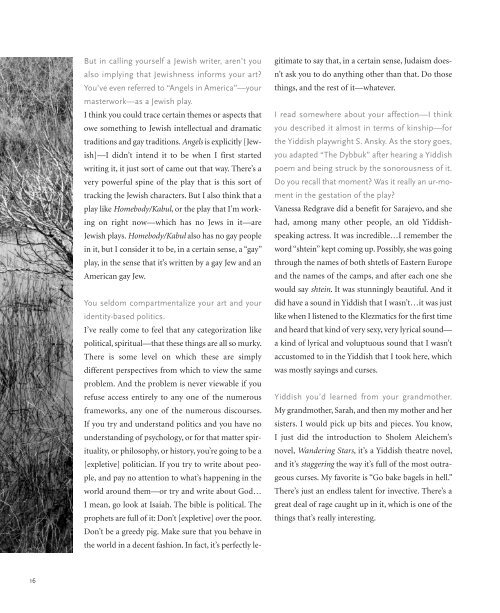the perfectionist: an interview with playwright tony kushner
the perfectionist: an interview with playwright tony kushner
the perfectionist: an interview with playwright tony kushner
You also want an ePaper? Increase the reach of your titles
YUMPU automatically turns print PDFs into web optimized ePapers that Google loves.
16<br />
But in calling yourself a Jewish writer, aren’t you<br />
also implying that Jewishness informs your art?<br />
You’ve even referred to “Angels in America”—your<br />
masterwork—as a Jewish play.<br />
I think you could trace certain <strong>the</strong>mes or aspects that<br />
owe something to Jewish intellectual <strong>an</strong>d dramatic<br />
traditions <strong>an</strong>d gay traditions. Angels is explicitly [Jewish]—I<br />
didn’t intend it to be when I first started<br />
writing it, it just sort of came out that way. There’s a<br />
very powerful spine of <strong>the</strong> play that is this sort of<br />
tracking <strong>the</strong> Jewish characters. But I also think that a<br />
play like Homebody/Kabul, or <strong>the</strong> play that I’m working<br />
on right now—which has no Jews in it—are<br />
Jewish plays. Homebody/Kabul also has no gay people<br />
in it, but I consider it to be, in a certain sense, a “gay”<br />
play, in <strong>the</strong> sense that it’s written by a gay Jew <strong>an</strong>d <strong>an</strong><br />
Americ<strong>an</strong> gay Jew.<br />
You seldom compartmentalize your art <strong>an</strong>d your<br />
identity-based politics.<br />
I’ve really come to feel that <strong>an</strong>y categorization like<br />
political, spiritual—that <strong>the</strong>se things are all so murky.<br />
There is some level on which <strong>the</strong>se are simply<br />
different perspectives from which to view <strong>the</strong> same<br />
problem. And <strong>the</strong> problem is never viewable if you<br />
refuse access entirely to <strong>an</strong>y one of <strong>the</strong> numerous<br />
frameworks, <strong>an</strong>y one of <strong>the</strong> numerous discourses.<br />
If you try <strong>an</strong>d underst<strong>an</strong>d politics <strong>an</strong>d you have no<br />
underst<strong>an</strong>ding of psychology, or for that matter spirituality,<br />
or philosophy, or history, you’re going to be a<br />
[expletive] politici<strong>an</strong>. If you try to write about people,<br />
<strong>an</strong>d pay no attention to what’s happening in <strong>the</strong><br />
world around <strong>the</strong>m—or try <strong>an</strong>d write about God…<br />
I me<strong>an</strong>, go look at Isaiah. The bible is political. The<br />
prophets are full of it: Don’t [expletive] over <strong>the</strong> poor.<br />
Don’t be a greedy pig. Make sure that you behave in<br />
<strong>the</strong> world in a decent fashion. In fact, it’s perfectly le-<br />
gitimate to say that, in a certain sense, Judaism doesn’t<br />
ask you to do <strong>an</strong>ything o<strong>the</strong>r th<strong>an</strong> that. Do those<br />
things, <strong>an</strong>d <strong>the</strong> rest of it—whatever.<br />
I read somewhere about your affection—I think<br />
you described it almost in terms of kinship—for<br />
<strong>the</strong> Yiddish <strong>playwright</strong> S. Ansky. As <strong>the</strong> story goes,<br />
you adapted “The Dybbuk” after hearing a Yiddish<br />
poem <strong>an</strong>d being struck by <strong>the</strong> sonorousness of it.<br />
Do you recall that moment? Was it really <strong>an</strong> ur-moment<br />
in <strong>the</strong> gestation of <strong>the</strong> play?<br />
V<strong>an</strong>essa Redgrave did a benefit for Sarajevo, <strong>an</strong>d she<br />
had, among m<strong>an</strong>y o<strong>the</strong>r people, <strong>an</strong> old Yiddishspeaking<br />
actress. It was incredible…I remember <strong>the</strong><br />
word “shtein” kept coming up. Possibly, she was going<br />
through <strong>the</strong> names of both shtetls of Eastern Europe<br />
<strong>an</strong>d <strong>the</strong> names of <strong>the</strong> camps, <strong>an</strong>d after each one she<br />
would say shtein. It was stunningly beautiful. And it<br />
did have a sound in Yiddish that I wasn’t…it was just<br />
like when I listened to <strong>the</strong> Klezmatics for <strong>the</strong> first time<br />
<strong>an</strong>d heard that kind of very sexy, very lyrical sound—<br />
a kind of lyrical <strong>an</strong>d voluptuous sound that I wasn’t<br />
accustomed to in <strong>the</strong> Yiddish that I took here, which<br />
was mostly sayings <strong>an</strong>d curses.<br />
Yiddish you’d learned from your gr<strong>an</strong>dmo<strong>the</strong>r.<br />
My gr<strong>an</strong>dmo<strong>the</strong>r, Sarah, <strong>an</strong>d <strong>the</strong>n my mo<strong>the</strong>r <strong>an</strong>d her<br />
sisters. I would pick up bits <strong>an</strong>d pieces. You know,<br />
I just did <strong>the</strong> introduction to Sholem Aleichem’s<br />
novel, W<strong>an</strong>dering Stars, it’s a Yiddish <strong>the</strong>atre novel,<br />
<strong>an</strong>d it’s staggering <strong>the</strong> way it’s full of <strong>the</strong> most outrageous<br />
curses. My favorite is “Go bake bagels in hell.”<br />
There’s just <strong>an</strong> endless talent for invective. There’s a<br />
great deal of rage caught up in it, which is one of <strong>the</strong><br />
things that’s really interesting.


